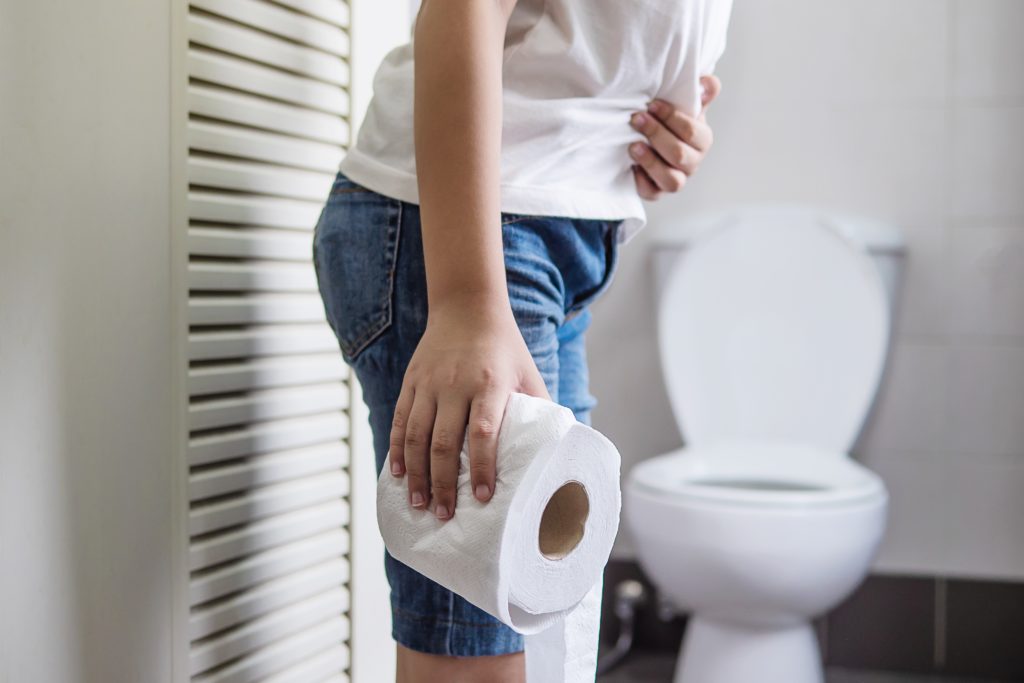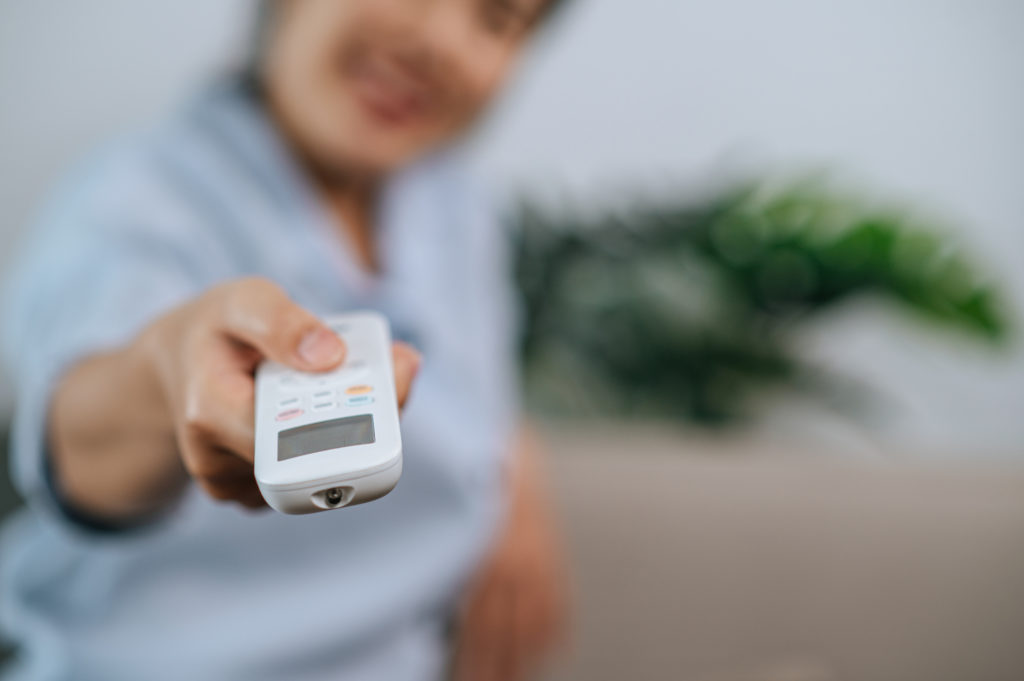6 minute read LiveRight Ayurveda, a young, energetic, and blooming Ayurvedic clinic, not only treats the physical and mental health of its patients but also gives the warmth and emotional support needed. For the past few months, we have...
6 minute readLiveRight Ayurveda, a young, energetic, and blooming Ayurvedic clinic, not only treats the physical and mental health of its patients but also gives the warmth and emotional support needed. For the past few months, we have had patients walking in complaining about sleep troubles and insomnia. Here, we have gathered the frequent and most important questions for the larger crowd of audience to be aware of when it comes to sleeplessness. Check out the answers given by our dedicated Ayurvedic doctor, Dr. Madhuvratha, to the most common questions proposed by our patients regarding sleeplessness and insomnia.
If reading is quite boring, then binge-watch the video below.
Most asked questions about sleep | Dr.Madhuvratha Q & A | LiveRight #sleep #sleeping #ayurvedaCan you give us some useful tips to sleep well at night?
Avoid using gadgets atleast 30 minutes before bed. This includes scrolling through mobile phones, browsing laptops, binge-watching television, frequently using smartwatches, earphones, headsets, etc. Reduce your screen time as much as possible before bed.
There must be atleast an hour’s gap between your dinner and bedtime. Don’t go to bed immediately after your dinner. It might disturb your digestion.
It is good to avoid caffeine, alcohol, and smoking after sunset.
Practice going to bed early and at a regular time every day. For example, if you have the habit of going to bed at 9 pm, then go to bed at the same time every day. Even though you don’t feel sleepy, go to bed when the clock strikes your regular bedtime.
Avoid unnecessary lights in your bedroom. The brain responds to light signals, making falling asleep difficult. A dark room is always good for a healthy sleep. Sometimes a light shade of light can even cause sleeplessness.
Daytime exercise is essential. This helps your body become tired naturally and makes it easier to fall asleep at night.
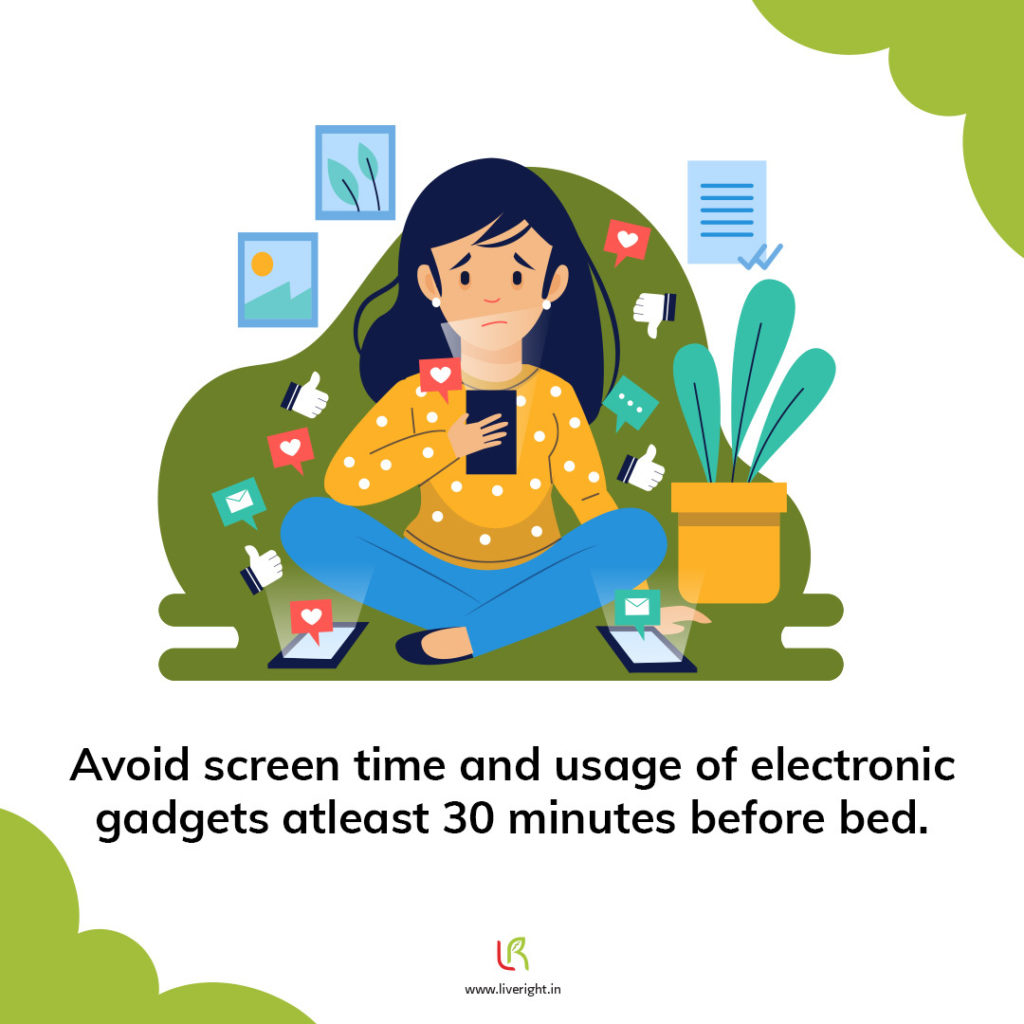
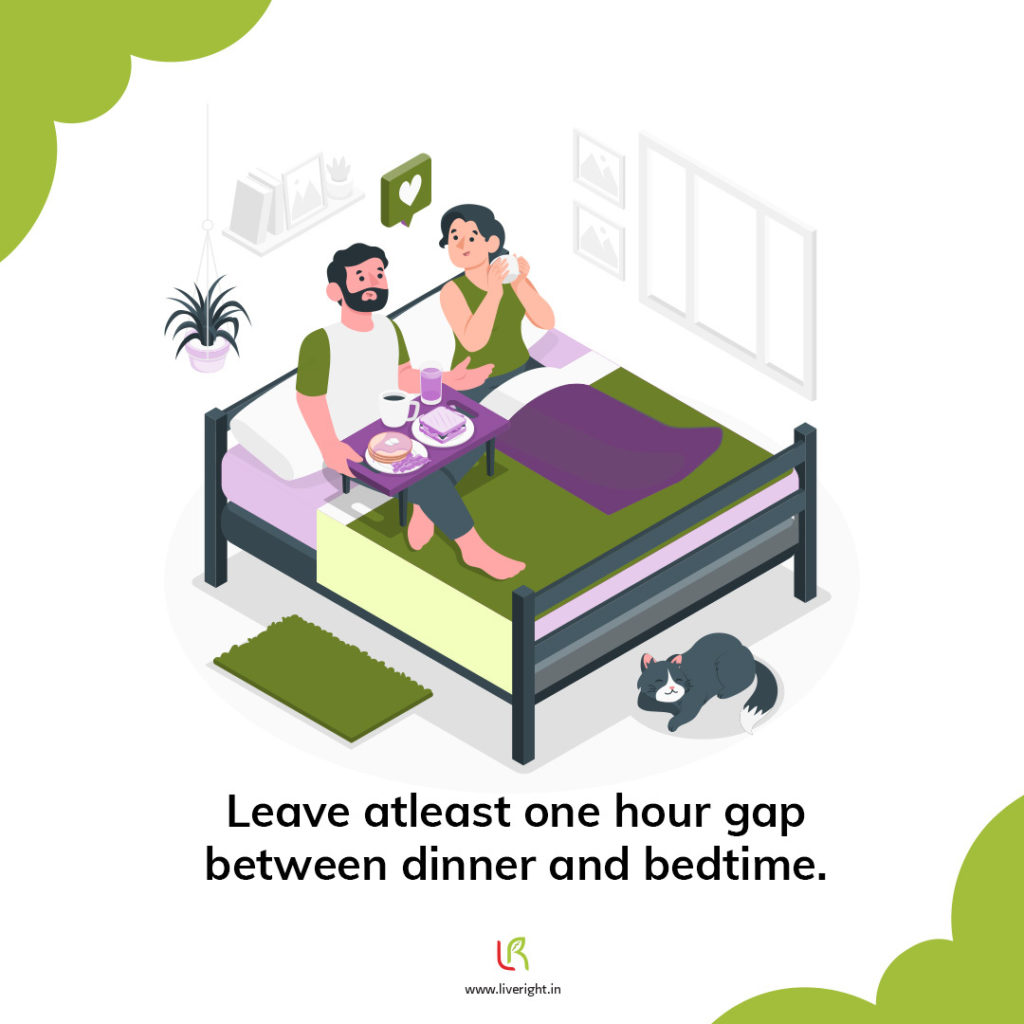
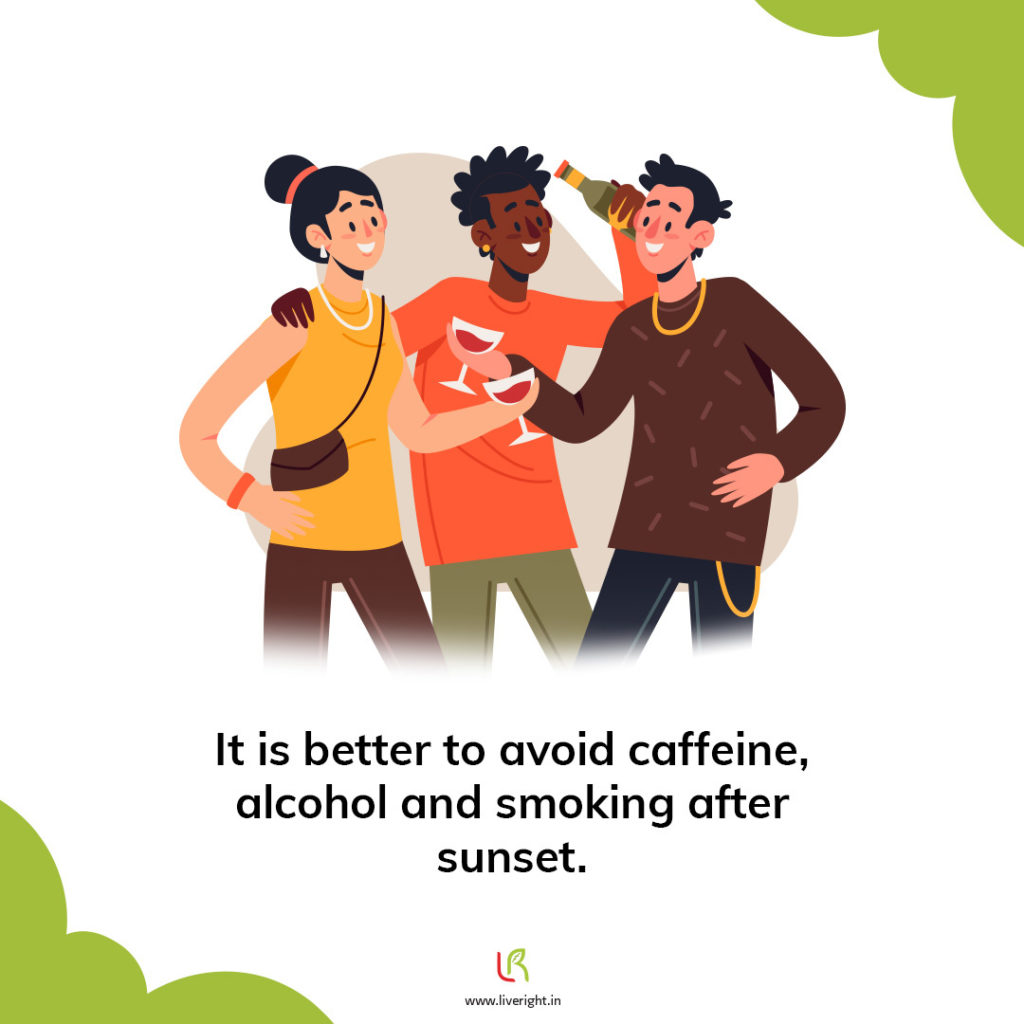
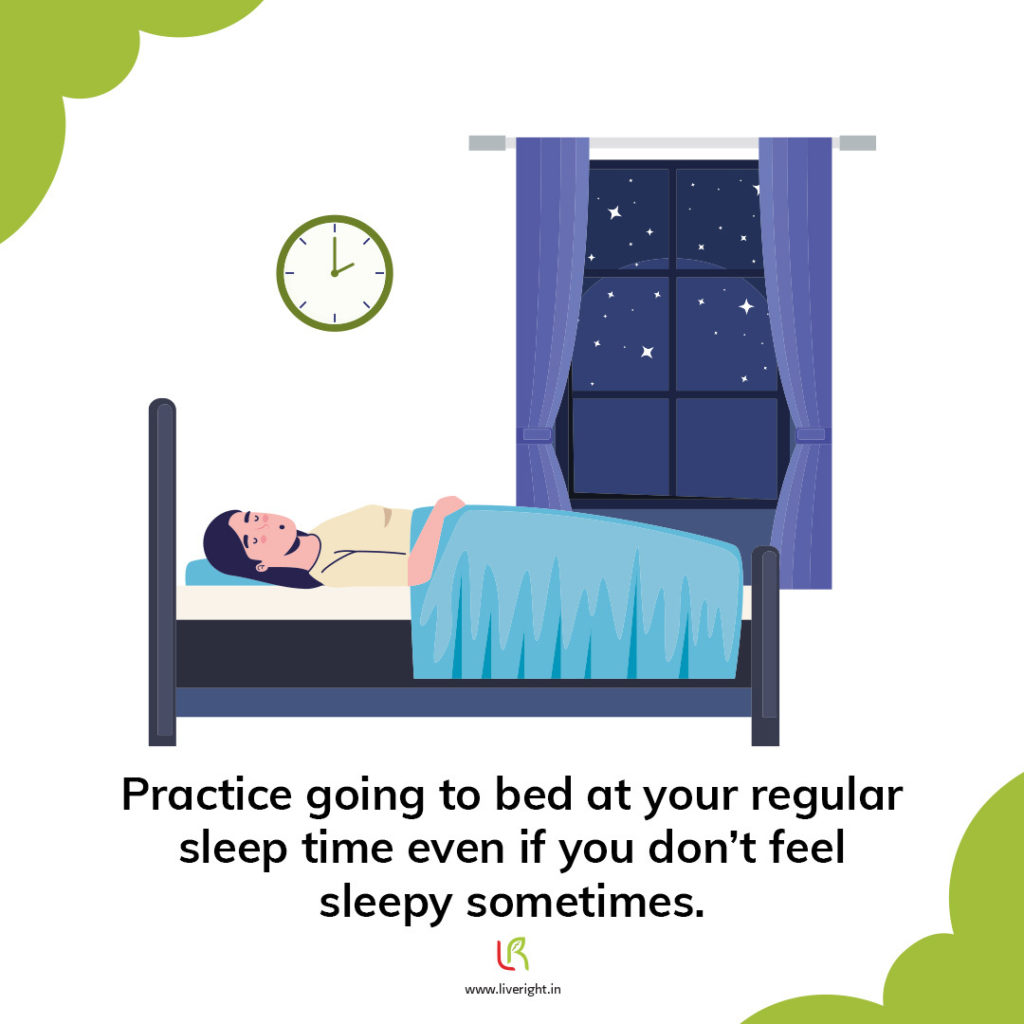
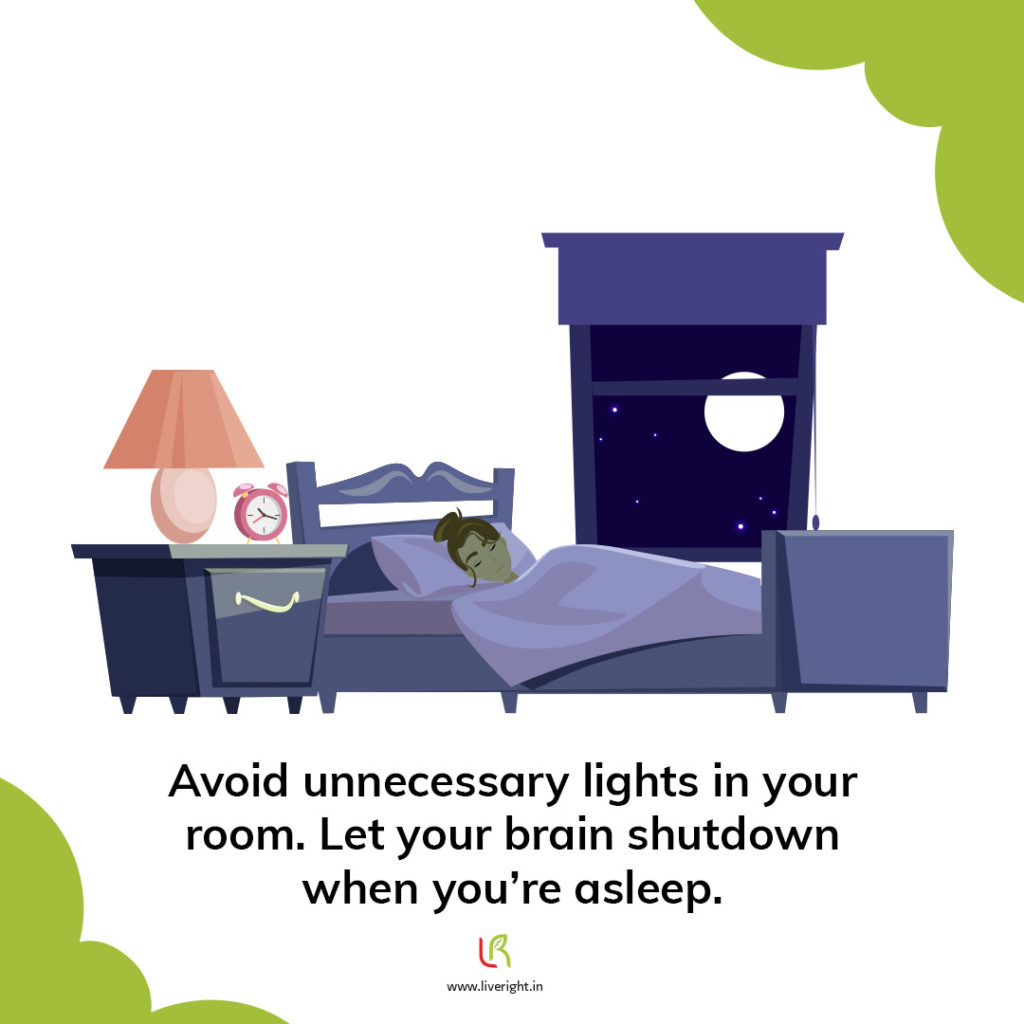
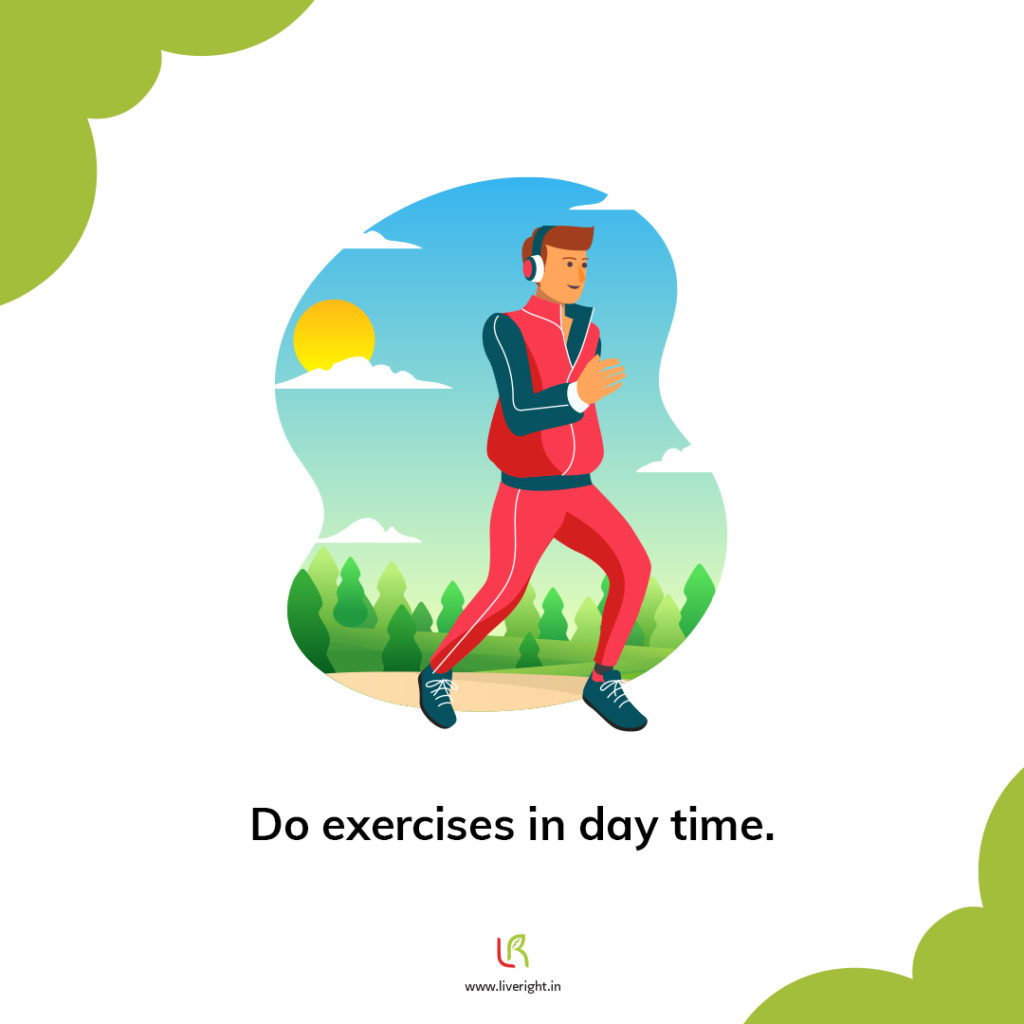
Which time at night for sleeping is best for your health?
That’s true that a normal adult needs 7 to 8 hours of sleep. But most of you could have misunderstood this sleep-time concept. As many think that going to sleep at 1 am and waking up at 8 am is quite normal, they have completed their 7 hours of sleep.
But this will not work if you want to maintain a healthy mind, body, and soul. The human body follows a specific biological clock. Being a night owl can disturb your body’s metabolism and cause indigestion or headache in the initial stage making it worse if you practice staying up late as a regular habit.
To avoid all these unhealthy disturbances, the perfect time to go to bed is 9:30 pm and wake up at 4:30 am. According to Ayurveda, this is the ideal sleep hour. This helps you complete 7 hours of sleep as well as you can grab your chance to wake up at Brahmamuhurta and feel the calmness and freshness in your mind.
Nowadays, professional life also plays an important role in disturbing your regular healthy practices. And there are many chances for you to experience sleeplessness. In such a situation, you can try going to bed before 10:30 pm and wake up at 5:30 am. Don’t delay it any further, as it is not advisable.
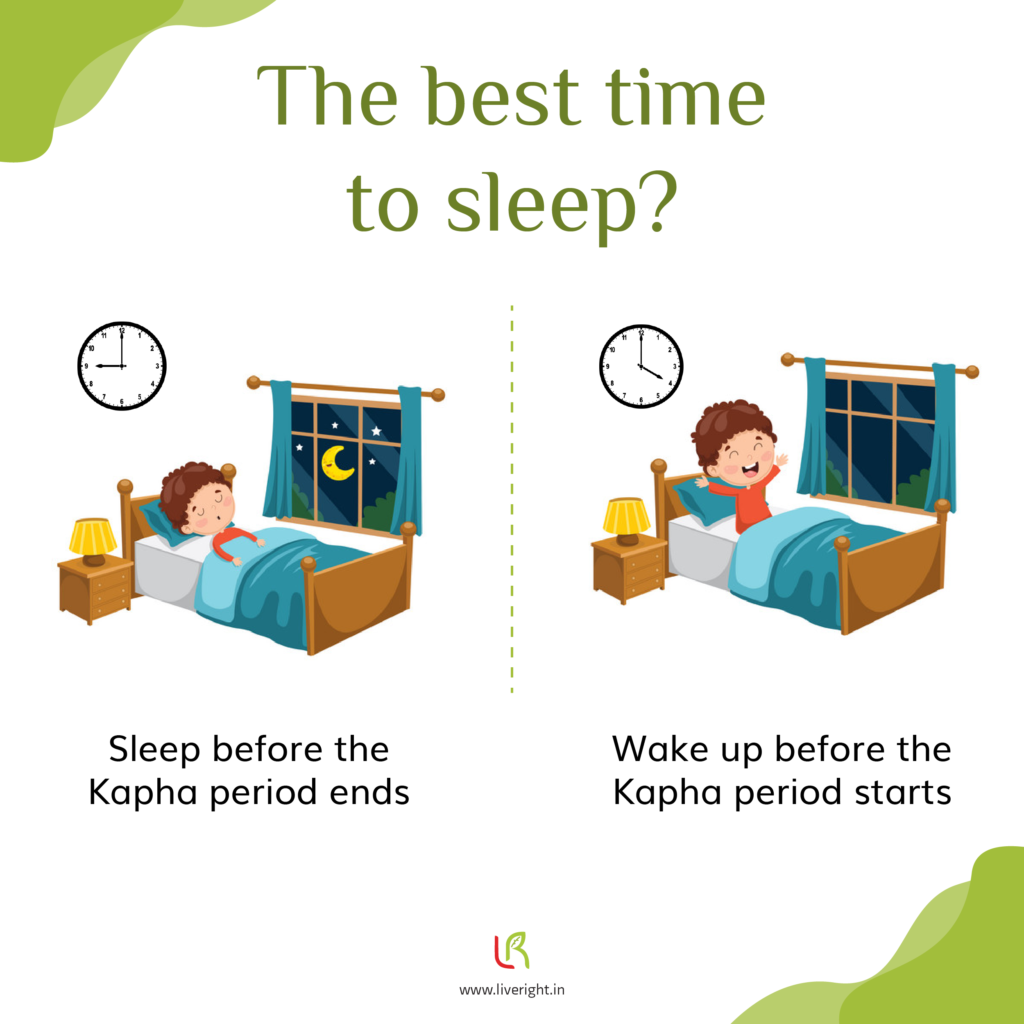
I am an 18-year-old student. If I sleep in the afternoon for 2 hours, can I skip 2 hours at night?
Can I compensate for my night sleep with daytime sleep?
I guess most of your little brains would have pondered upon this question atleast once in a lifetime.
Technically it is right, you can compensate for your night sleep with daytime sleep. But you must also be aware of how to bring this into practice. Ayurveda has given a wonderful explanation for this interesting concept. You can compensate for two hours of night sleep with one hour of daytime sleep.
There are many recent research activities performed to understand sleep compensation techniques. But Ayurveda has beautifully calculated this. If you miss two hours of night sleep then compensate that with one hour of daytime sleep. Reducing half the time of night sleep to compensate for daytime sleep helps in minimalizing the metabolic disturbances caused by the Kapha energy generated during daytime sleep. So you can follow this to maintain your normal sleep cycle.
What are the foods that disturb sleep? How to plan a healthy diet to overcome sleeplessness?
This is one of the most frequent questions proposed by many of our patients.
Prefer easily digestible foods for dinner. Avoid heavy foods at night. The word “heavy” here not only talks about the quantity of food but also about the true essence or the potency of the food. Examples of some heavy foods – milk products excluding milk (curd, butter, ghee, paneer, cheese), leafy green spinach varieties, fruits, roti, bread, packaged foods, millets, etc.
Then What food is suitable for dinner?
Light and easily digestible foods can calm your body and mind for a good sleep. For example – congee, upma (thick porridge), rice with vegetables, soup, and steamed foods like idly (steamed cakes of rice batter and other ingredients), puttu (steamed rice flour with coconut shavings), idiyappam (string hoppers).
Diet is one of the primary solutions to cure sleeplessness. These foods can help prevent acidity and promote good sleep.
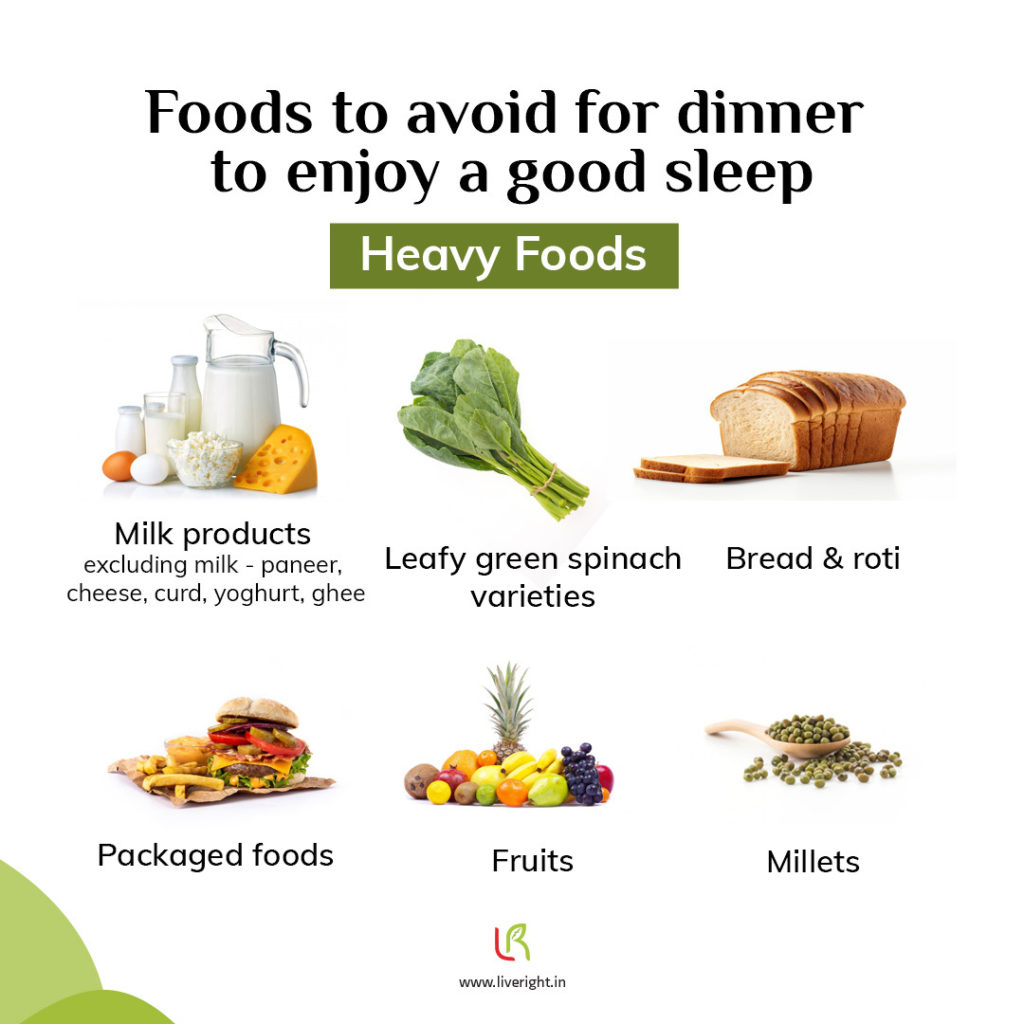
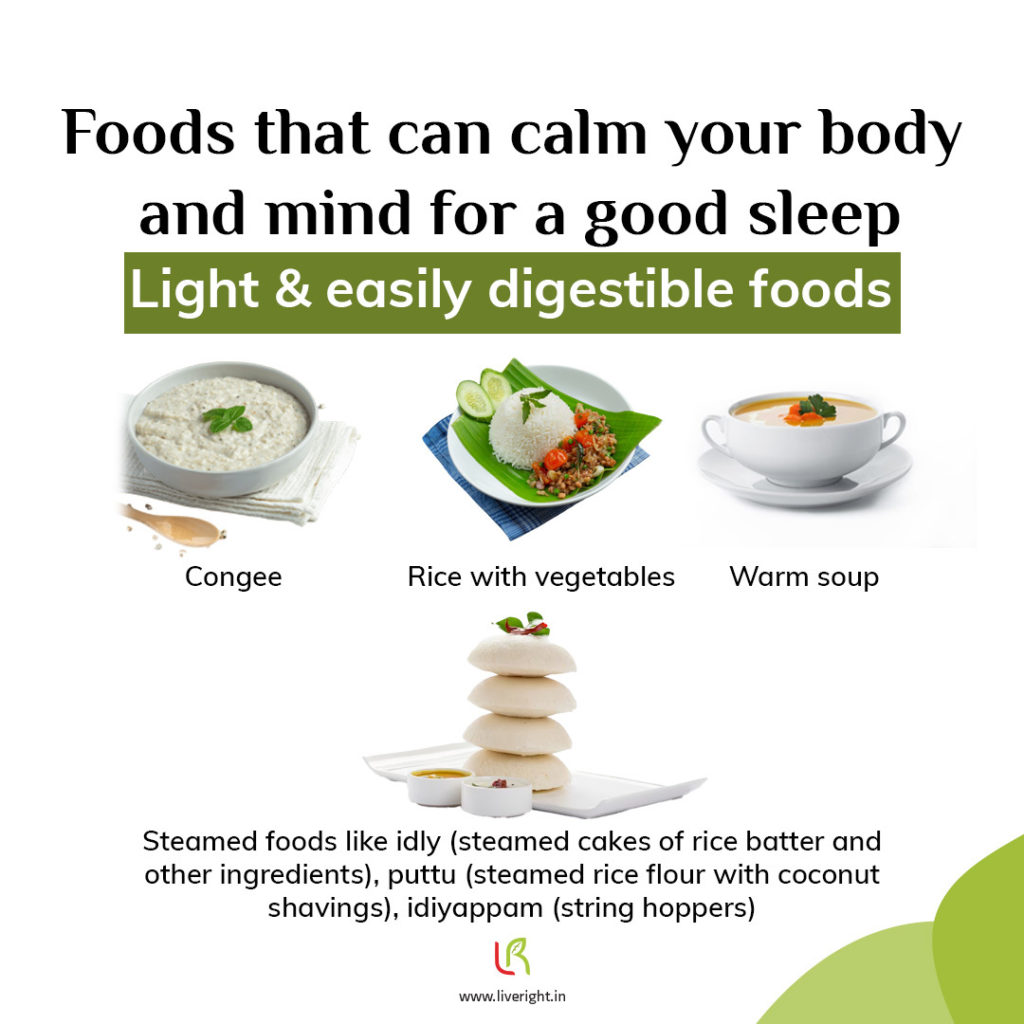
When I try to sleep, I experience sudden palpitations, throbbing fingers, and occasional tension. What can I do to fix this issue?
Sudden jerks or palpitations, muscle cramps, and increased heart rate are some involuntary movements that happen without our consciousness. These sudden movements are called hypnic jerks. There is a small duration between being awake and falling asleep. This duration is called the transition phase during which these jerks commonly occur. In the same way, these jerks occur during the transition period between superficial and deep sleep.
These symptoms are very common. Almost 70% of the population have these symptoms and it is still unclear why exactly these jerks occur. But on the surface, abnormal brain activity can be one of the reasons for such symptoms.
What could be the reason for such abnormal brain activity?
Anxiety & stress – Incomplete or overthinking about something before going to bed stops you from reaching the complete sleep state. This causes anxiety creating nerve impulses leading to such jerks. Relaxation techniques and meditations can help you keep your brain calm before sleep. Excessive stimulants – Don’t perform activities or take foods that stimulate your nerves as they can block you from reaching a deep sleep state. For example – too much caffeine or alcohol intake, smoking (presence of nicotine), listening to music, and scrolling through mobiles, all keep your brain active and never allow you to fall asleep. The best solution is to stop all of these atleast two hours before bed to maintain a calm mind that is ready for sleep. Nervous problems – This is due to improper lifestyle patterns. When no proper diet or sleep pattern is followed then your nerves lose balance making your brain unable to control these sudden movements. Practice a healthy diet and lifestyle. Nerve disorder – People suffering from Alzheimer’s, Epilepsy, and Parkinson’s are prone to these sudden jerks. These jerks get reduced along with the treatment given for their specific nervous disorder conditions.So far we have addressed some of the important and frequent questions related to sleeplessness. You can leave a comment below in case you have more such queries. We would be happy to address those too!
RELATED: How To Prioritize Sleep Based On Your Dosha?







